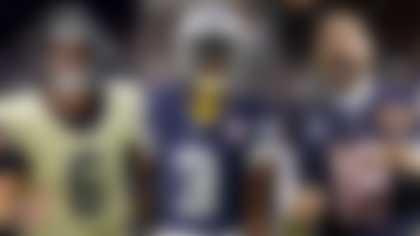AURORA, Ohio -- Alone in a makeshift gym that normally serves as a hotel ballroom, San Francisco 49ers rookie running back Marcus Lattimore had found his place on an elliptical machine shortly after arriving at the NFC's portion of the NFL Rookie Symposium.
The lectures hadn't started. The breakout sessions, yet to begin. But in this room, where the only noise came from the dull humming of Lattimore's elliptical machine, a chilling lesson was already on display across six large televisions mounted on the wall.
It was Aaron Hernandez's face. It was live coverage of his arraignment. It was the moment when Hernandez's identity took a sharp turn from football star to murder suspect; when the dreams of his youth were curtailed by the reality of his situation.
The rookie symposium here in suburban Cleveland is a place where the NFL tells its newest crop of players how to keep dreams on track -- and so there could be no more symbolic way for NFC attendees to arrive than this.
"Hopefully, the NFC guys that are here, the guys that just came in, it's going to mean that much more," said Chris Draft, an NFL transition coach. "All the stories that they hear, all the experiences, are now going to be that much more impacting.
"And the AFC guys that just left, everything they were told here about the details, about a dream, about dream-killers of sorts, all of those things will mean that much more."
This is not to suggest Hernandez's latest saga will serve as an empathetic scenario for each of the 254 rookies who will attend this week's symposium. This is rare. But the overall message is nonetheless quite pointed: A life can change in a day. A dream can be thwarted in a moment. Regardless of the final verdict in Hernandez's eventual trial, this situation has changed his daily existence in an incomprehensible way. It is the NFL's hope to teach these rookies to comprehend it only enough to avoid it.
That's why the NFL brings Adam Jones here to speak. That's why Tank Johnson, Maurice Clarett and former basketball star Chris Herren are also here to tell a roomful of fresh faces about their own misguided careers. None of those men have ever been charged with murder -- but each of those men at times did indeed become his own worst enemy.
And each shares his story in an effort to create the type of lasting impressions -- the type of critical lessons -- that could be learned Wednesday by watching Hernandez stand handcuffed in a court room.
"We're not here to make them better football players -- coaches do that," said Irving Fryar, a panelist at this week's symposium. "We are trying to make them aware of things around them -- of the people around them -- to make them better people."
This week, when Tank Johnson spoke to the AFC's players, the former defensive tackle who was often in trouble with the law didn't simply try to tell players what not to do. He also tried to teach them a tangible lesson: The NFL makes resources available. The help exists. It's up to the players to utilize that help.
At one point in his career, Johnson said, he was banned from owning a gun by the league because of previous weapons charges. Yet one day, after he caught thieves breaking into his car, he went to the store to buy a gun. While in line to pay, he decided to call NFL Commissioner Roger Goodell.
"Don't do it," Goodell told him. "Don't buy the gun. Instead, I'll have security outside your house every morning and every night for the rest of the summer."
By the time Johnson got home, a security guard was on the premisis to protect his house.
"The resources exist," Johnson said. "I learned it too late. You need to use those resources."
The NFL will do everything possible this week to drive home these points. They'll have Jones tell stories to players about blowing $100,000 to rent out the top of the Caesars Palace in Las Vegas for his family -- and the ensuing loneliness he later felt during his one-year suspension. They'll have Clarett talk about his 3 1/2-year prison sentence -- and they'll have him explain how his actions ruined his chances for a football career.
The NFL will even hold panels with successful former players like Chad Pennington, LaVar Arrington and Patrick Kerney. This isn't just about how dreams go bad -- it's also about how to dream even bigger.
But as this year's rookie symposium runs its course, there is a very sad reality that still exists: "You can't help everybody," Kerney said. "People need to want to help themselves."
Maybe that explains the strange, surreal feelings at the symposium Wednesday. As much as the league can use Hernandez as a prime example of how an identity can be altered in a day, the tale of his detoured dream also shows that its efforts don't always pay off.
But as Lattimore continued to work out on that elliptical Wednesday, as he stared at those televisions, it was also a reminder of another reality: It is indeed possible that some rookie will leave this symposium with a lesson, that some rookie will realize the fragility of his dreams and make the proper decisions to keep them intact.
"Unfortunately, sometimes bad things happen," Draft said. "The rookie symposium is about wisdom, about how to learn from the mistakes of others. When something like this is happening at the same time, it can make it that much more important that they are listening."
So, are they listening? Are these rookies really learning how to avoid life's pitfalls?
Hopefully, we won't find out in a courtroom.
Follow Jeff Darlington on Twitter @jeffdarlington











